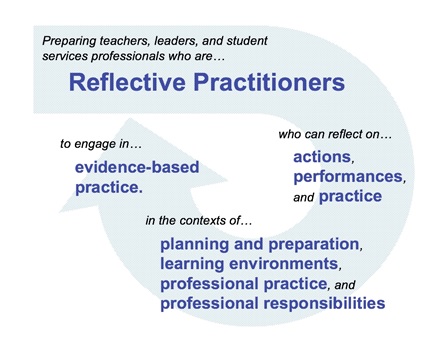Cooperating Teacher Online Training
Purpose
This training is designed for educational professionals who are interested in mentoring student teachers from Edgewood College. Our hope is that this will serve as a valuable resource to our PK-12 partners, offering updates on Division of Education student teaching criteria, policies and procedures.
After reading the information in each module, you will be asked to submit an assignment related to the module. This training module satisfies the Wisconsin Department of Public Instruction’s training criteria for cooperating teachers. This may also serve as a resource for experienced cooperating teachers providing update of the state of Wisconsin and teacher education preparation criteria, policies and procedures.
Department of Public Instruction
Cooperating Teacher Criteria
Chapter P1 34: Teacher Education Program Approval and Licenses
The Department of Public Instruction requires that cooperating teachers meet the following three criteria:
- Hold a Wisconsin license or its equivalent for the teaching assignment and have volunteered to serve as a cooperating teacher.
- Have at least 3 years of teaching experience with at least one year of experience in the school system of current employment.
- Have completed training in both the supervision of clinical students and the applicable standards in subch. II PI 34.15.
Modules to Complete:
**Please note that if you will be a Cooperating Teacher to a student that is in an add-on license program, (your student teacher already holds a license in another area or developmental level, is adding ESL/Bilingual, or another licensable major or minor) you will be responsible for the material presented in Modules #3 and #4. Please submit the assignment for Module #3 and the completed Verification Form.
Module #1:Edgewood College School of Education Conceptual Framework
Module #2:Policies and Procedures
Module #3:Mentoring Your Student Teacher
Module #4:Evaluation of a Teacher Candidate
Module #1: Edgewood College School of Education Conceptual Framework
Edgewood College, rooted in the Dominican tradition, engages students within a community of learners committed to building a just and compassionate world. The College educates students for meaningful personal and professional lives of ethical leadership, service, and a lifelong search for truth.
Edgewood College’s goal is to engage it’s students in exemplary teaching practices, and service. To ensure that graduates become successful professional educators in PK-12 settings. Further, the School of Education’s vision is to prepare teachers and other professional educators who are Reflective Practitioners and participate in evidence-based practice.

The process of becoming a reflective practitioner follows a framework for teaching that includes (Danielson, 1996):
a) planning and preparation
b) classroom environment
c) instruction
d) professional responsibilities
These four domains are aligned to the Wisconsin Educator Standards and the InTASC (Interstate Teacher Assessment and Support Consortium) Standards for Teacher Development and Licensure and contain necessary and specific components that are assessed at multiple stages throughout each student’s teacher education preparation program.
Module #2: Policies and Procedures
The Clinical Practicum and Student Teaching Handbook serves as a guide for student teachers, cooperating teachers, and college supervisors regarding Edgewood College practicum and student teaching field experience teaching policies, procedures, and expectations. Some education programs may supplement this handbook with program-specific information or forms. These programs include ACE, ASP, and CCSE.
Please read the information in the handbook carefully prior to the start of the field experience and contact the Coordinator of Clinical Experience, or the college supervisor with questions or concerns.
You may access the handbook during the student teaching experience as well, if you have questions regarding your student teacher and how to best support them in their placement.
Edgewood College Clinical Practicum and Student Teaching Handbook
Module #2 Assignment – Getting Ready
Module #4: Assessments
Evaluation of a Teacher Candidate
The evaluation of a teacher candidate is a continuous process that is undertaken by the cooperating teacher, the university supervisor, and the student teacher. Comments regarding a candidate’s knowledge, skills and dispositions in teaching should be specific and constructive. The emphasis on the Wisconsin Educator/InTASC Standards, the domains of learning, and on authentic assessment using a variety of tools and techniques will provide candidates with a successful experience.
Evaluation Feedback
On-going day-to-day evaluative feedback can be made through comments written on their lesson plans, shared journal, separate evaluation sheets, or through verbal discussion. Time should be set aside daily to discuss questions, address concerns, or to provide reflection on the day’s events.
Mid-Semester Evaluation
Mid-semester evaluation serves as a progress check for the teacher candidate and is based upon the Wisconsin Educator/InTASC Standards. In addition to your assessments of the teacher candidate’s performance and dispositions, it is important for the teacher candidate to evaluate their progress on these standards. You will complete this evaluation on Handshake – a link will be sent mid-semester.
Final Evaluation
Final Evaluation of the Wisconsin Educator/InTASC Standards is to be completed toward the end of the student teaching experience by the cooperating teacher via a link to Handshake. This evaluation is the same as the mid-semester evaluation, and will allow the teacher candidate to see their growth over the course of their student teaching experience.
Wisconsin Educator Standards Evaluation
Upon reviewing these 4 modules, please complete the assignments, linked below, and send them to clinical@edgewood.edu. Upon submitting those assignments, please also complete the Verification form.